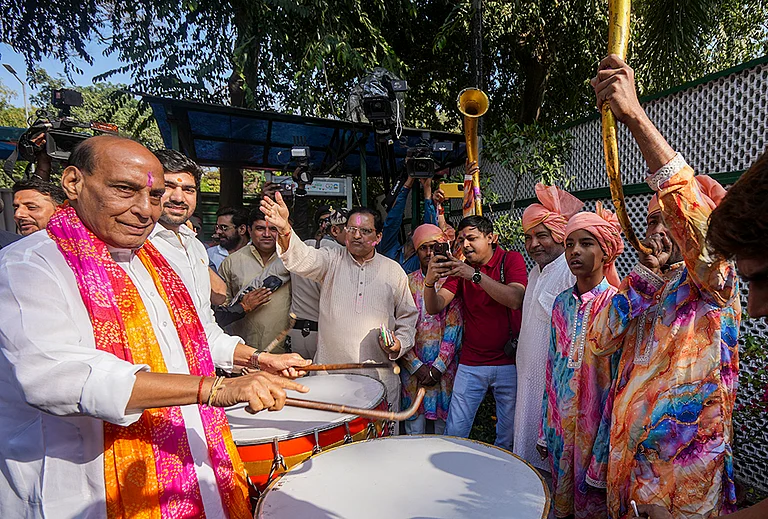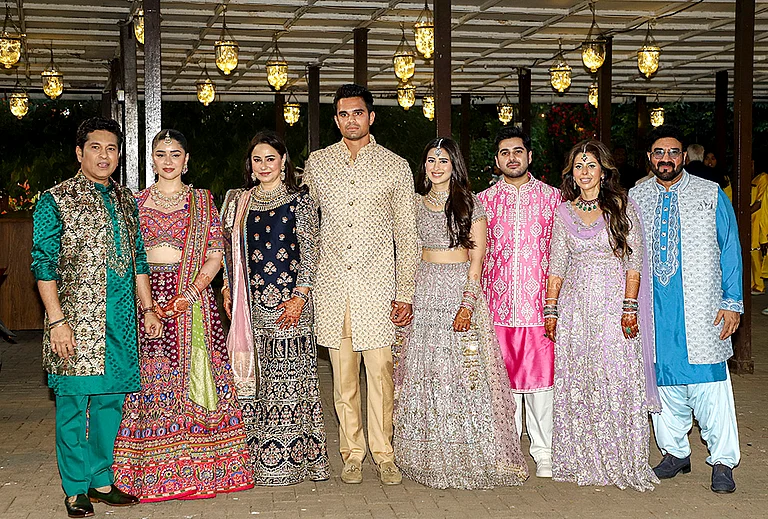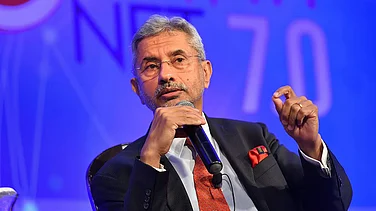IF absolute control of Uttar Pradesh is a precondition for the conquest of Delhi, then I am afraid the throne of Delhi remains in serious dispute. And, at the time of writing, the Congress figures nowhere in this dispute, Sonia Gandhi's exertions in the state notwithstanding. This is one of several impressions I have formed after driving through 20 constituencies in Avadh, eastern UP and the Kumaon hills.
I drove from Lucknow with two journalists from major Indian publications. We drove through Barabanki, Sultanpur, Amethi, Rae Bareli, Pratapgarh, Allahabad, Mirzapur, Varanasi, Phoolpur, Azamgarh, Akbarpur, Lalganj, Faizabad, Saidpur and Kanpur and later to Ghaziabad, Moradabad, Rampur, Nainital and Almora.
Generally, we steered clear of party offices and local scribes. We spoke to individuals and groups, selected at random, in the bazaars, tea stalls and town centres. We made it a point to visit at least two, sometimes three, villages in each constituency, several kms from the main road. If it was essential to win the confidence of Muslims, the most secretive group on this route, I spoke to them alone. My two Hindu colleagues joined me later. Similarly, my colleagues spoke separately to groups from the majority community who, by our reckoning, might otherwise have hedged their bets.
The trick on such assignments is to find an experienced and enthusiastic driver. We found the perfect man. An ardent BJP fan, one who had saved journalists as well as participated in the demolition of the Babri Masjid, he is a big, burly jovial man, a bit like Amjad Khan, with a roving eye and a juicy phrase for every beautiful face he spotted. His enthusiasm on the steering wheel remained undiminished because my colleagues, at regular intervals, inflated the BJP's chances. It must be a commentary on the political mood in this state, that at the end of the journey our driver, politically alert, was a wiser if not exactly a disappointed man.
Partly because of the absence of noisy electioneering, this is aesthetically the most satisfying election I have ever covered in this state. Acres upon acres of lush, mustard fields are spectacular in the crisp February air. I have never known UP's roads so motorable, for which credit must go to those responsible for this improvement.
In the main bazaar of Ambedkar Nagar, the new name given by Mayawati to Akbarpur and which appropriately is her constituency, Hari Prasad Gupta sits cross-legged in his cloth shop. Yusuf Ali, a tailor, has parked his old Singer machine just at the edge of Gupta's shop. "This time Mayawati will be taught a lesson for the manner in which the Harijan Act was implemented by her," Gupta says. "It was an instrument of general harassment." Gupta is, by his own admission, a BJP supporter.
But the BJP sees Mulayam Singh Yadav as its prime enemy. Why, then, was he targeting Mayawati and the BSP in what was supposed to be Mayawati's stronghold? Ali, busy at his machine, mildly endorses Gupta's point. "Many people seem to believe that Mayawati will lose," he says. Just then two middle-aged men on bicycles pull up behind us: "The entire Patel (Kurmi) vote is going to Mayawati," one of them says.
Gupta shows signs of agitation—"You are the only Patel I know who supports Mayawati," he blurts out. We take the two men aside to get at the truth. One of them has mischief in his eyes. "Our tactic is to defeat Gupta mentally and our strategy is to weaken all casteist parties." This is a bit of a puzzle for us. Ali laughs, then offers enlightenment. "They are CPI(ML) workers countering the RSS whispering campaign. " Clarity dawns a few kms along the same road. The skyline above the main bazaar is dominated by a giant gas-filled balloon in the shape of a blue elephant, the BSP's symbol. Its further flight is arrested by a long rope tied to the pillar of a house. The house owner, an LIC agent, Asghar Hussain, is quite transparently a harassed man. "What can I say," he complains. "I am a BSP worker but the campaign against behenji (Mayawati) and the Harijan Act seems unstoppable." He looks a pitiable character, floating the party elephant and brooding on the imminence of Mayawati's defeat.
In Mirzapur, Prof. Lalji Chaturvedi collects quite a gathering outside his house. "What kind of justice was this," he pleads. "One night an Ambedkar murti was planted on a fellow Brahmin's field and the administration did nothing."
The refrain against the Harijan Act cuts across all constituencies until you reach Azamgarh, where the BSP's Dumpy Ahmad is challenging the Samajwadi Party's Ramakant Yadav. Here the act is not the issue. The two personalities are.
Dumpy Ahmad's campaign has a touch of Bollywood choreography. The backdrop is compelling. For years the area has seethed with rage at Ramakant Yadav's alleged atrocities. But so dreaded is Yadav that nobody has ever seriously challenged him. Now comes Dumpy Ahmad, standing on an open jeep, driving from village to village. "Where is this man, terrorising the poor people of Azamgarh?" Ahmad yells like Amitabh Bachchan in the badlands. "Tell him that Dumpy is willing to face his bullets, but no poor man will ever be touched by any goonda in this constituency." The crowd is in raptures. So anti-Yadav is the mood that even a section of Thakurs has lined up behind Dumpy, giving up their support for the BJP. The SP's Amar Singh, who is emerging as the most dynamic Thakur leader in UP, may be visiting Azamgarh to attract the Thakurs.
In 1996, Ahmad had won just 87,000 votes on the Tiwari Congress ticket. This time he has the BSP vote base plus all the others ganging up against Yadav. In Azamgarh, Ahmad is the rallying point against a notorious candidate. In Ambedkar Nagar there is a similar ganging up against Mayawati without any strong rallying point.
The edge is with the SP. But both these elections are not representative. In both instances, the electorate is being mobilised for or against strong personalities.
The Harijan Act, however, will plague Mayawati throughout the campaign. Designed to consolidate the scheduled castes with the Chamars as the core, the Act has caused a consolidation on the other side cutting across caste lines.
This must not detract from the contribution of the BSP towards Harijan self-esteem. We stopped at a shop in Lalganj to ask one Mukul Sharma the way to a neighbouring village. Sharma was quite clear that he was a BJP supporter. But when I asked Mithu Lal, draped in a tattered shawl, standing near Sharma, he did not mince words. "I am a pure Dalit and I shall always vote for Mayawati."
THIS is a new phenomenon in UP villages—the candour and relative fearlessness with which the Harijan speaks his mind. But this is about all. The psychological strength to mobilise themselves into a solid vote, in the absence of a BSP government in Lucknow, is not in their domain yet.
A few miles from the main road, past lush mustard fields and mango groves, the village of Tiuri in Mirzapur has a majority of Chamars, mostly landless labourers. Bare-bodied young men arrange themselves in a circle around our car. "Of course we would like to vote for our biradari," says Ram Dhari (he can even speak sentences in English). "But the Thakurs in the village never allow us to go to the polling booth."
He continues: "In the last election, they beat my brother with lat-his—he nearly died." Others join in chorus. "By 9 am we were told that our votes had already been cast and that we need not go to the polling station." The irony is that these are all cheerful faces, reporting the denial of franchise simply as part of their fate.
IT is possible that since Tiuri happens to be in Mirzapur, Phoolan Devi's constituency, the community most determined to thwart her chances last time were the Thakurs, victims of the famous massacre at Behmai. But Thakurs and Brahmins, it transpires, did not vote in large numbers in 1996 when Phoolan won. Paras Nath Singh, a Thakur from Tiuri explains why. "Elections were held in very hot weather. Many of us did not go the polling booth. We were complacent. This time we shall vote." This fact, plus the fear that Abdul Hadi Ansari on the Congress ticket might cut into some Muslim votes, might well give an edge to the BJP. Phoolan Devi's political fortunes, in other words, may be in decline.
Sonia Gandhi's massive first rally in Amethi may well have created an impression on TV that it was some sort of a turning point in the elections. But the crowd we saw disperse was a tepid, lukewarm collection, not indicating determined electoral shift. Even in Rae Bareli the refrain was, "It would have made a difference if Sonia had contested the election." But the feeling throughout was that the Congress workers had been enthused and if this enthusiasm could be sustained, the party would have something to fall back on in the next elections. So splintered is the traditional Congress vote into its constituent castes that it is an impossible proposition to put it all together again in a hurry.
Conspiracy theories are not infrequent at mofussil headquarters. The BSP is contesting all 85 seats to divide the vote so that the BJP has an advantage. The sociology, however, is not so straightforward. The BSP has not built a dam on the Harijan surge by containing it within itself. This vote is spilling over and it is not going to the BJP in substantial numbers. The shift in the caste configuration could well be to the SP's advantage.
Moreover, the Muslim vote is being clever. "You must meet Imtiaz Mian," says Aashiq Ali in Saidpur. "He is a BJP karyakar-ta (worker)". The man standing next to him winks. Obviously, the trick is to project divisions in the Muslim vote to avoid Hindu consolidation in the BJP's favour. Compare this intelligent approach by Muslims in rural India to the inept call by the so-called Muslim intelligentsia to vote against the BJP, a call which can lead to majority consolidation behind the BJP.
At least 20 different groups told us 90 per cent of the Muslim vote would go to the SP unless there is an alternative which is likely to defeat the BJP. "In Pratapgarh we shall vote for Dinesh Singh's daughter, Ratna Singh, the Congress candidate," says Dildar Hussain.
The Congress has fielded so many Brahmins that if there is even a minimal return of this traditional Congress support to its fold, the benefit again would go to the SP. At present this vote is solidly with the BJP. A drive through Nainital and Almora revealed that Narain Dutt Tiwari may be able to save face in these two constituencies. Should that happen, the credit should go to him and not to Sonia Gandhi whose entry has made no difference whatsoever. In fact, a shopkeeper in Majhkali village stared at me in astonishment when I asked him if Sonia would make a difference. "People here know nothing about her."
In Rasra village in Saidpur, Kripa Shankar Chaubey, a school teacher, placed his hand on the shoulder of a Chamar standing by his side. "We shall vote according to our castes, in that case why should I strengthen Kalyan Singh?" But surely he supports Atal Behari Vajpayee? "That is another matter," he says looking very thoughtful. His basic grouse is that the state government has not implemented the Pay Commission's recommendations as far as the teachers are concerned.
Throughout the journey, there was not a single mention of the term "stability", nor any extraordinary enthusiasm for Vajpayee. A rearrangement of castes and community combinations is largely determining the course which could result in the SP advancing, the BJP staying at 52 seats or being reduced, Mayawati facing a partial eclipse and Sonia Gandhi's prestige being precariously poised.




















